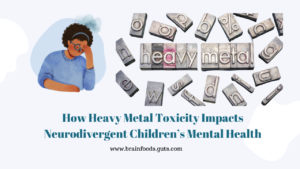 How heavy metal toxicity impacts neurodivergent children’s mental health is a rising concern. With heavy metals like lead, mercury, arsenic, and cadmium finding their way into everyday items like household products, food, and water, the risk of exposure is higher than ever. While this poses health risks for everyone, neurodivergent individuals, such as children with autism or ADHD, are particularly vulnerable. The effects of these toxins can exacerbate the symptoms of neurodivergence, making it crucial for families to understand how to protect their loved ones.
How heavy metal toxicity impacts neurodivergent children’s mental health is a rising concern. With heavy metals like lead, mercury, arsenic, and cadmium finding their way into everyday items like household products, food, and water, the risk of exposure is higher than ever. While this poses health risks for everyone, neurodivergent individuals, such as children with autism or ADHD, are particularly vulnerable. The effects of these toxins can exacerbate the symptoms of neurodivergence, making it crucial for families to understand how to protect their loved ones.
In this blog, we’ll explore how heavy metal toxicity impacts neurodivergent children’s mental health, common sources of heavy metals, and offer practical tips to reduce exposure and detox safely.
Sources of Heavy Metals in Everyday Life
Heavy metals can be found in surprising places. While we may not see them, they often lurk in items we use daily. Here are some of the main culprits:
- Tap Water: Lead and cadmium can leach into drinking water through aging pipes, especially in older homes.
- Food: Some seafood, like tuna and swordfish, contain high levels of mercury. Produce grown in contaminated soil may also have traces of arsenic and cadmium.
- Hygiene Products: Cosmetics, especially lipsticks, can contain lead, while deodorants and antiperspirants often have aluminum.
- Household Items: Older paints (pre-1978) may still contain lead. Certain ceramics or imported dishware can leach cadmium.
- Industrial Pollution: Air pollution from factories can introduce heavy metals into the air, which then settle in soil, water, and even onto food.
The cumulative exposure from these sources, particularly in children with heightened sensitivities, can significantly impact mental and physical health.
The Impact of Heavy Metals on Neurodivergent Children’s Mental Health
Once heavy metals enter the body, they accumulate over time, often in vital organs such as the liver, kidneys, and brain. For neurodivergent children, this accumulation can be particularly harmful, amplifying their challenges and affecting their mental well-being. Here’s how specific heavy metals can influence mental health:
1. Mercury Heavy Metal Toxicity Impact on Mental Health
Mercury, commonly found in seafood, can cross the blood-brain barrier, impacting brain function. It’s associated with cognitive issues, memory problems, and mood swings. In neurodivergent children, mercury exposure can worsen symptoms of autism or ADHD by interfering with neurotransmitter function, leading to behavioral changes or heightened sensory sensitivities.
2. Lead
Even low levels of lead exposure can lead to learning difficulties and behavioural problems. For neurodivergent children, lead can disrupt brain development, making existing developmental disorders more severe. Children with autism, in particular, may experience heightened sensory issues, difficulty focusing, and increased irritability as a result of lead exposure.
3. Aluminum
Though aluminum is not as toxic in small quantities, long-term exposure has been linked to neurodegenerative diseases like Alzheimer’s. For children with ADHD or autism, aluminum may contribute to sensory sensitivities, memory problems, and challenges in processing information.
4. Cadmium and Arsenic Heavy Metal Toxicity Impact on Mental Health
These heavy metal toxicity impacts on mental health can be in the form of induced oxidative stress and damaged brain cells, impairing memory, attention, and other cognitive functions. In children with neurodivergence, cadmium and arsenic can further disrupt attention spans, exacerbate anxiety, and contribute to mood instability.
Practical Ways to Reduce Heavy Metal Exposure at Home
For families with neurodivergent children, reducing heavy metal exposure can significantly improve mental health outcomes. Here are practical steps you can take:
1. Use a High-Quality Water Filter
Lead and cadmium often enter the body through drinking water. A water filter certified to remove heavy metals can drastically reduce exposure.
2. Choose Organic and Locally Sourced Foods
Organic farming avoids the use of synthetic pesticides and fertilisers that may contain heavy metals. Locally sourced food is also less likely to be exposed to industrial pollutants, making it a safer option for your family’s meals.
3. Switch to Non-Toxic Household Products
Opt for natural cleaning products and avoid using older household items that may contain lead or cadmium, such as old paints or imported dishware.
4. Use Natural Hygiene Products
Switch to personal care products labelled as free from heavy metals. This includes deodorants free from aluminium and cosmetics that do not contain lead.
5. Limit High-Mercury Fish
While fish is a healthy protein, certain types contain high levels of mercury. Limit consumption of tuna and swordfish and opt for low-mercury alternatives like salmon, sardines, or trout.
6. Air Purifiers
Air pollution can be a hidden source of heavy metals in your home. Using air purifiers, especially in highly industrial areas, can help filter out heavy metals from the air.

Fig 2: Polluted air can be a source of heavy metal toxicity
Safe Medical Approaches to Detoxification
If you’re concerned about heavy metal toxicity, it’s important to detox safely, especially when dealing with children. Here are some safe and effective medical approaches:
1. Chelation Therapy
Chelation therapy involves the use of chemicals that bind to heavy metals in the bloodstream, allowing the body to excrete them. However, this therapy should always be done under medical supervision, as it can have side effects.
2. Supplements and Nutrition
- Cilantro and Chlorella: These natural chelators help remove heavy metals from the body. Cilantro mobilises metals from tissues, while chlorella binds to them, aiding in elimination.
- Antioxidants: Nutrients like vitamins C and E, glutathione, and selenium can protect brain cells from oxidative damage caused by heavy metals.
- Fiber-Rich Foods: Consuming fruits, vegetables, and whole grains can assist the body in detoxing naturally, as fiber helps eliminate toxins more efficiently.
3. Sauna Therapy
Infrared sauna therapy promotes sweating, which can help expel heavy metals. This method is non-invasive and can be a supportive addition to your detox routine.
4. Liver Support
Supporting liver function is essential, as the liver is the primary organ responsible for detoxifying heavy metals. Herbs like milk thistle, dandelion root, and turmeric can aid in liver detoxification, helping the body process and eliminate toxins more effectively.
Conclusion
Heavy metal toxicity impact on mental health can be particularly harmful to neurodivergent children, exacerbating symptoms of autism and ADHD and affecting cognitive function. By taking steps to reduce exposure and supporting the body’s detox processes, families can create a safer, healthier environment for their loved ones. Always consult with a healthcare provider before starting any detox program to ensure it’s safe and effective.
Stay proactive, protect your family’s mental health, and take control of your home environment.
References:
- Grandjean, P., & Landrigan, P. J. (2014). Neurobehavioural effects of developmental toxicity. The Lancet Neurology, 13(3), 330-338.
- Rice, K. M., Walker, E. M., Wu, M., Gillette, C., & Blough, E. R. (2014). Environmental mercury and its toxic effects. Journal of Preventive Medicine and Public Health, 47(2), 74-83.
- Tchounwou, P. B., Yedjou, C. G., Patlolla, A. K., & Sutton, D. J. (2012). Heavy metals toxicity and the environment. EXS, 101, 133-164.



